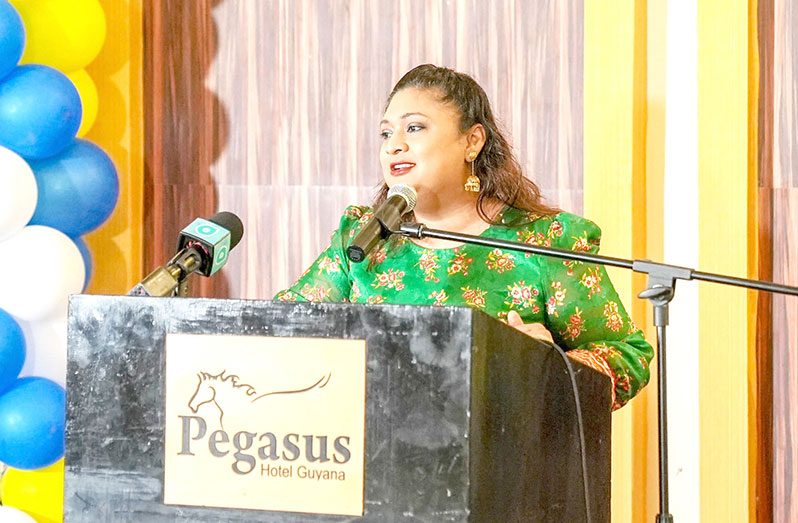–says Minister Manickchand
THE administering of the COVID-19 vaccine to children five to 11 years is expected to commence on Friday, and when it has been sufficiently rolled out across the country, public schools will be fully reopened at all levels.
Minister of Education Priya Manickchand, in making this disclosure on Tuesday, estimated that this full reopening could happen as soon as next term.
“I don’t think an entire term will pass with us staying home and being out of school. And so, it is important that if the vaccine is available to you, that you avail yourself of it,” Minister Manickchand said, adding:
“On Friday, the Ministry of Health is going to launch the 5 – 11 campaign for vaccination. That means that the Pfizer vaccine, properly measured, will be offered to all children across the country. We are giving the appropriate time to allow everyone to get that vaccine. Once the time has passed, we are going back into schools.”
The minister was at the time making remarks at a “National Play Symposium” held at the Pegasus Hotel in celebration of Guyana’s 45th Anniversary of Nursery Education.
Noting that “hard decisions will have to be made”, she warned that it is doubtful that COVID-19 will ever fully go away. She said that with vaccination offering a high level of protection against adverse effects of the virus, and most of the population now being able to be inoculated, it would be as safe as it could be for learners to return to school.
“COVID is going nowhere; it is going to be here with us like polio, malaria, and the common flu, and we are probably not going to get 100 per cent vaccination, so hard decisions will have to be made,” Minister Manickchand said.
She said that while vaccination remains voluntary, those who choose not to get vaccinated will have to live with the consequences of their choice, as Guyana and the rest of the world move towards the post-COVID-19 era.
“Right now, every person 12 years and older can access a vaccine in this country for free. At this stage, anyone not getting the vaccine is someone choosing not to get the vaccine, and the government has been very clear: We are not holding you down and putting shots in your arm. It remains a choice, but choices will have consequences. We are not going to be able to stay home anymore; so, shortly, this country will resume full normalcy in the classroom,” she declared.
Minister Manickchand highlighted the lengths to which the government has gone to ensure that citizens feel as comfortable as possible about the vaccination, by making a diverse range of COVID-19 vaccines available free of charge.
Currently in Guyana, the Pfizer BioNTech vaccine is available to persons aged 12 to 18 years old, while the Sputnik V, Sinopharm, Astrazeneca, and Johnson and Johnson are available to all persons 18 years and above.
Few countries are believed to have such a wide range of COVID-19 vaccines available to its population free of cost. As such, Manickchand said she believe that enough is being done to ensure the protection of Guyana’s population.
During her remarks, the minister explained that the current state of the partial reopening of schools is severely hampering the ministry’s roll out of several developments in education, and as such when the vaccination is completed, school doors will be reopened.
“Trying to introduce any new measure into any system to see effectiveness, we can’t do it Online, effectively. We can’t do it with a one-day attendance, [or] with two hours per day, two days per week effectively. While there was a dream and longing prior to ‘COVID’ about teaching Online and using technology, we know that, for sure, it can’t be the sole means of delivering education, because it is not effective,” Minister Manickchand said.
Public schools in Guyana are currently using customised rotational openings, which started in September. Prior to this, schools were closed for a lengthy period, and learners were exposed to virtual learning.
Schools in Guyana had first closed their doors in March 2020, as a result of measures implemented by the government to curb the spread of the virus.
The closure and the subsequent partial reopening of school has severely affected education delivery in Guyana.
Manickchand stressed that the need for schools returning to the customary face-to-face sessions has become imperative.
“Normalcy is no longer a clichéd word; normalcy now means the difference between a child being able to access higher education and not. It’s the difference between your child being able to succeed and be better than you are, and not,” she said, adding:
“So, harsh decisions will be taken; harsh to you, but beneficial to our children, because whatever we do has to be in the best interest of the children of this country. We are certain, here today, that it is not in our children’s best interest to stay home.”



.jpg)











